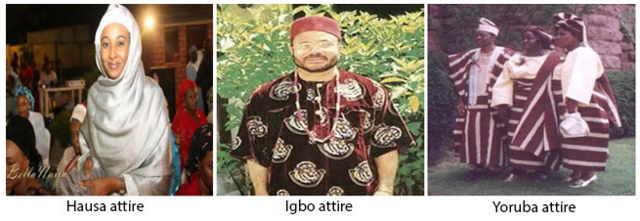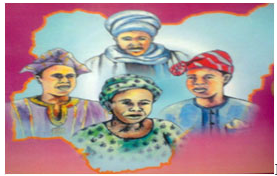
Cultural Differences in Dressing: Hausa, Igbo and Yoruba Attires
Nigeria as a nation has many cultural differences. These include:
- Language: This is of the most remarkable difference which distinguishes one culture from the other in Nigeria. We have over 250 indigenous languages in the country.
- Religion: Apart from the two major religions: Christianity and Islam, there are various traditional religious beliefs in Nigeria.
- Arts and Crafts: This also differs. For instance, while those in the south engage in wood carving, the northerners engage in leather works.
- Food: Those in the southern part of Nigeria eat food made mostly from tubers like fufu while the northerners eat food made from grains e.g. tuwo.
- Dressing: The Igbo man wears caftan and ties a wrapper while the woman ties wrapper with a blouse. The Hausa man on the other hand wears a Babariga while the woman wear clothes that often cover the whole body.
- Greetings: The various ethnic groups in Nigeria have their various patterns of greeting. The Yoruba man prostrates before the elders while the female ones kneel down. The Hausa male squats while the female kneel down.
- Shelter: Climate and natural endowment also reveals differences in culture. A typical Fulani man will live in hut made with grasses. A Yoruba man will live in a brick house. The climate of Northern part of Nigeria is very harsh. Resources of the place are also different from the southern part of Nigeria. This differences dictate the type of culture we found in any part of the country.
- Behavioural pattern: Behavioural pattern also varies from one culture to another. What is a taboo in one culture may not be a taboo in another culture.
Meaning of Identity
Identity is used to refer to those who share the same culture and regard themselves as one people. Culture is a means of identifying people.
Levels of Identity
- Family: Everyone shares his family’s identity through his surname. He identifies with his parents and siblings. The family teaches him the culture of the society in its own way.
- Age group: A person identifies with his age-group. He tries to defend the interest of such group. Each age-group has its own norms and practices which members must obey. It may also have some means of communication which non-members may not understand. Age-group is very important in Igbo land and a man who fails to identify with his age-group may not be recognized.
- Town/Village: A person identifies with his place of birth. He contributes to its progress both in cash and in kind. He belongs to one or more associations in his village or town.
- Cultural or Ethnic group: Another level of identity is the cultural or ethnic group. Each Nigerian identifies himself as a Yoruba, Igbo, Kanuri or Bachama. Language, dressing and eating habits reveals the cultural background of a person.
- Local Government: This is the smallest political unit in Nigeria. Every Nigerian belongs to a local government, the development of which he contributes to and from which he enjoys some services and social amenities.
- State of Origin: A person identifies himself with his state of origin be it Cross River or Taraba State. He may like his state to win in an inter-state sport competition.
- National Identity: All the 36 states form one country which is called the Federal Republic of Nigeria. We are one people under one Federal Government, enjoying the same services and obeying the same law. The Nigeria passport, the National Anthem, the National Pledge and the National Flag are all symbols of identity for Nigeria citizens both at home and abroad.

National Identity
Read our disclaimer.
AD: Take Free online baptism course: Preachi.com 